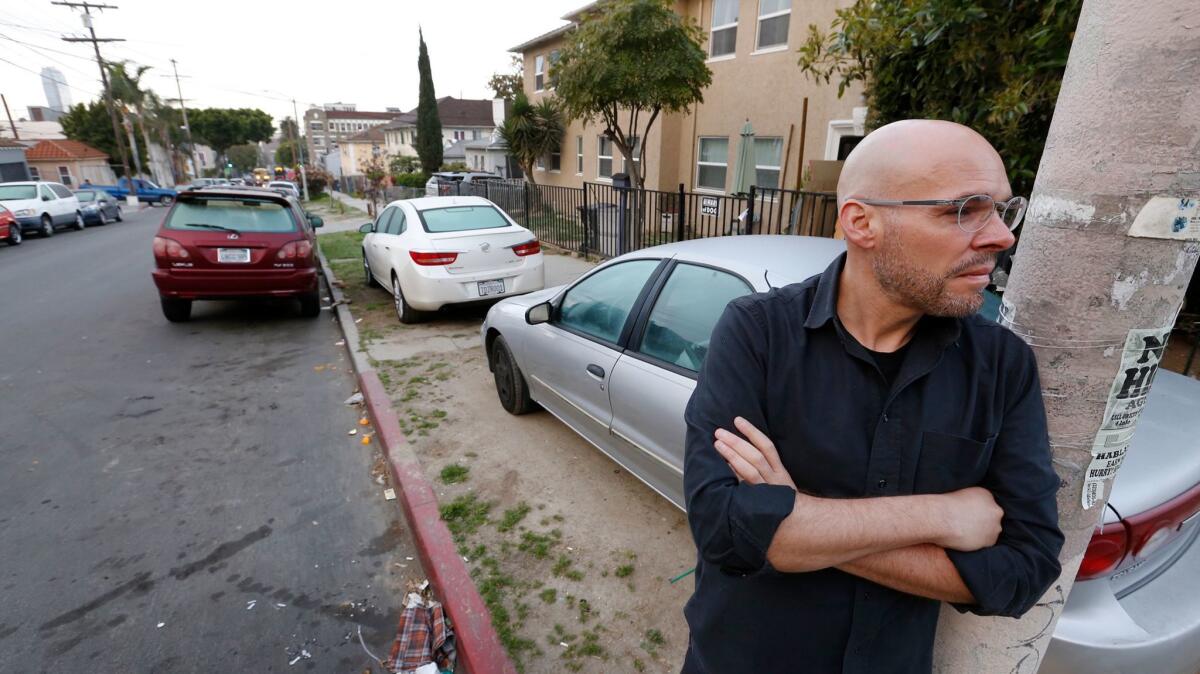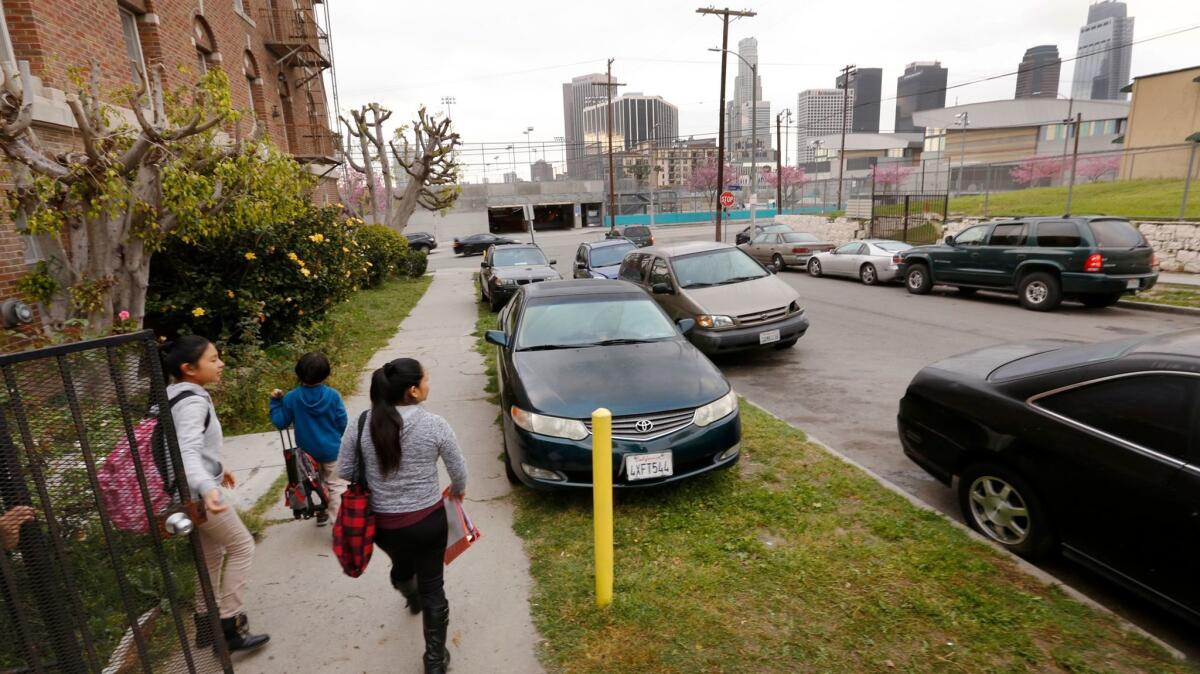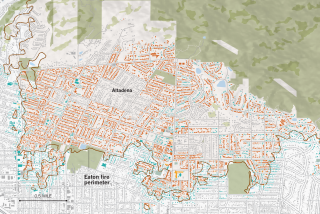L.A. might start citing motorists again for parking on city parkways
- Share via
The afternoon rush hour had just begun, and drivers already were circling like sharks on Westlake’s quiet side streets, hunting for parking.
One man in a red sedan pulled into a driveway on Miramar Street and made a hard left, bumping over the driveway apron and stopping on a bedraggled patch of grass between the curb and the sidewalk.
As a gardening crew stared from across the street, the driver stepped out of his car, locked the doors and walked away.
“Wait, can he do that?” said Juan Carlos Hernandez, 24, shaking his head. “We can do that?”
The short answer: Yes.
For more than five years, the Los Angeles City Council has told parking officers not to ticket cars parked on parkways — an umbrella term that includes the public land between the sidewalk and the curb, as well as the sloping aprons that connect driveways to the street.
The council’s 2011 decision to suspend parkway enforcement came in response to an outcry from residents who had been cited for parking on driveway aprons. A lull in enforcement, officials said, would give drivers some relief and give the city time to craft new policies.
But the five-year gap in enforcement has also encouraged a wave of renegade parkers in dense neighborhoods, who know that hopping the curb to park on the grass won’t lead to a ticket.
Late at night, more than a dozen cars rest on parkways in some blocks of East Hollywood, Koreatown and Westlake. Vehicle wheels have left grass rutted with tire tracks and crumbing curbs.
“They’re taking advantage of the space they can find,” said Greg Savelli, the transportation department’s chief of parking enforcement. Though the city didn’t advertise the policy change, he said, it’s clear that drivers have finally caught on.
Although parkway enforcement itself has been suspended, the city has continued to cite drivers whose cars hang over the sidewalk or block the road.
Parkway enforcement will resume when the council reverses the policy, Savelli said. City officials have twice postponed hearings on the issue, and the item has not been rescheduled.
As they wait for City Hall, frustrated residents leave notes on windshields and step onto parkways to stop their neighbors from parking. Others resort to guerrilla tactics — planting trees, laying gravel and installing bollards — to protect the public right-of-way.

“I don’t want to say ‘anything goes,’ but right now, it seems so,” said Stephen Sedalis, 47, of Westlake. “In the past six months, it’s exploded.”
Westlake has the highest population density in Los Angeles, with more than 39,700 residents per square mile. Apartments here, with little off-street parking, can often house multiple adults and multiple cars.
One night late last year, Sedalis counted more than 40 cars and trucks parked on the parkways within four blocks of his house.
“It was a free-for-all,” Sedalis said. “That’s when I was like, ‘Something crazy is going on.’ ”
When calls to parking enforcement yielded little help, Sedalis went to Home Depot and spent $29 on palm trees to plant along a nearby parkway. A neighbor installed wooden stakes and a flowering vine that were later knocked down.
When Ruslan Sibagatullin, 34, moved to East Hollywood several years ago, he planted jacaranda and magnolia trees to add beauty to his block and create relief from the sun.
As the saplings grew, so did the the number of people parking near them. At least one driver bumped into one tree, scraping its bark.
“There are more people and more cars, and the situation is becoming more intense,” Sibagatullin said. “The street looks like a parking lot. It’s an eyesore.”
A few blocks south, Rachel Neumann keeps track of a white pickup truck that frequently parks on the grass outside her building on Kenmore Avenue. If she’s nearby when the driver arrives, she said, she steps onto the grass and asks him to leave.
“People are parking there out of frustration and necessity,” said Neumann, 34, an urban planner, adding that street parking can be fiercely competitive. “But they shouldn’t be able to do it with no implications.”
The council vote to suspend parkway enforcement followed a series of civil rights lawsuits that claimed the city’s broken, sometimes impassable sidewalks violated the Americans with Disabilities Act. One of the cases, which will be settled pending court approval, alleged that apron parking also violated the act.
City lawyers later advised transportation officials to pay closer attention to whether cars on driveway aprons blocked access to the sidewalk.
The ticketing crackdown that followed sparked an outcry from residents in Westwood and on the Eastside, who said they had depended on the apron spaces and that, in some cases, had been guaranteed the use of them in their leases.

The City Council eventually suspended enforcement of the policy until separate laws for parkways and driveway aprons could be written. At the time, officials pointed out that the city’s municipal code contained conflicting definitions of “parkway,” which could make the law unenforceable.
Five years passed.
A spokeswoman at the public works department said the city has waited to draft a new law “to make sure that it’s accurate.” But two officials said the city wants to rewrite the parkway law after it settled the disability act lawsuits.
A spokesman for City Atty. Mike Feuer declined requests for comment.
During the suspension of the parkway law, the city still issued 102 tickets to cars parked on parkways in 2015 and 2016, according to city data.
Savelli said the majority were issued by Los Angeles police officers who hand-wrote the tickets instead of using their hand-held devices, which would have alerted them to the policy change.
“They never should have been issued,” he said, adding that the tickets would be canceled and any fines refunded.
Once the City Council approves a new parkway policy, parking enforcement will spend some time educating drivers, rather than resuming ticketing immediately, Savelli said. That could include leaving fliers on windshields, instead of citations.
The change can’t happen fast enough, said Sedalis of Westlake. “The only thing that’s comforting is that this is so ridiculous that something has to happen.”
For more transportation news, follow @laura_nelson on Twitter.
ALSO
Trump extends FEMA help for flooded California counties
L.A. high school baseball player ‘beaten beyond recognition’ in alleyway assault
More to Read
Sign up for Essential California
The most important California stories and recommendations in your inbox every morning.
You may occasionally receive promotional content from the Los Angeles Times.











